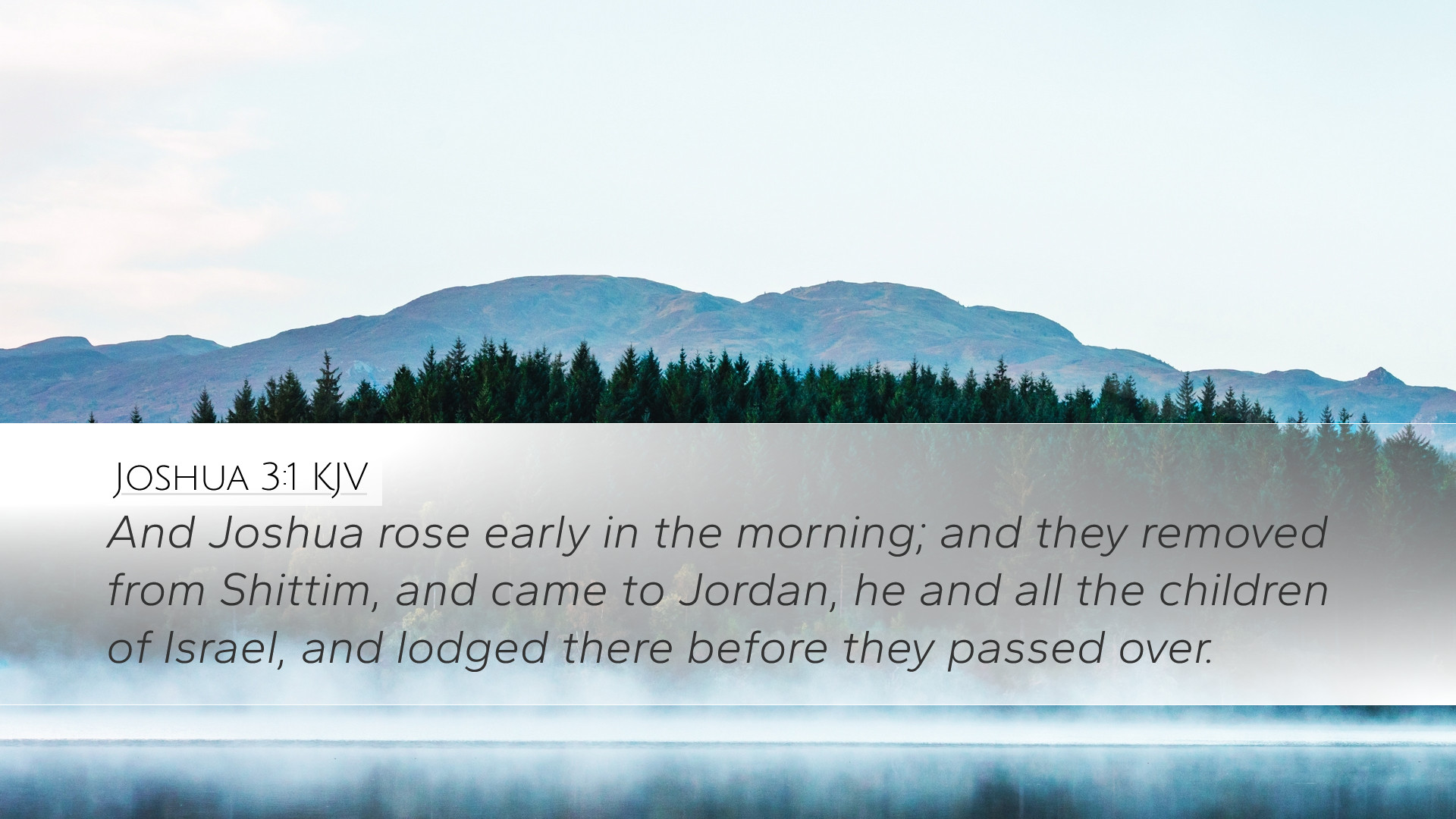Old Testament
Genesis Exodus Leviticus Numbers Deuteronomy Joshua Judges Ruth 1 Samuel 2 Samuel 1 Kings 2 Kings 1 Chronicles 2 Chronicles Ezra Nehemiah Esther Job Psalms Proverbs Ecclesiastes Song of Solomon Isaiah Jeremiah Lamentations Ezekiel Daniel Hosea Joel Amos Obadiah Jonah Micah Nahum Habakkuk Zephaniah Haggai Zechariah MalachiJoshua 3:1
Joshua 3:1 KJV
And Joshua rose early in the morning; and they removed from Shittim, and came to Jordan, he and all the children of Israel, and lodged there before they passed over.
Joshua 3:1 Bible Commentary
Commentary on Joshua 3:1
Verse: "And Joshua rose early in the morning; and they removed from Shittim, and came to Jordan, he and all the children of Israel, and lodged there before they passed over."
Introduction
This verse marks a significant moment in the narrative of Israel's journey to the Promised Land. The actions of Joshua and the children of Israel reflect themes of preparation, faith, and the divine guidance they are about to receive.
Exegesis of Joshua 3:1
Joshua's early rising signifies diligence and seriousness in leadership. In the context of the Israelites’ journey, Shittim represents both an ending and a beginning — the conclusion of their wilderness wandering and the imminent crossing into Canaan.
Matthew Henry's Commentary
Matthew Henry emphasizes the importance of Joshua's attentiveness and the choice to rise early. He notes that the early rising of Joshua points to a man of conscious responsibility and devotion, showcasing a typical trait of effective leadership.
- Diligence in Preparation: Joshua’s actions illustrate the need for leaders to prepare themselves and others for divine tasks.
- Faithful Guidance: This moment reinforces the belief that God’s guidance requires both preparation and action from His people.
Albert Barnes' Commentary
Barnes highlights the significance of the location, Jordan, as a barrier between Israel and their promised inheritance. He notes that the crossing of the Jordan is an act of faith and trust in God’s promises.
- Transition to the Promised Land: The act of lodging by the Jordan signifies a pause for reflection and preparation before a major transition.
- God’s Timing: The Israelites' waiting period shows their dependence on God’s timing for crossing the Jordan, illustrating that every significant step in faith involves waiting for divine instruction.
Adam Clarke's Commentary
Clarke provides a deeper look into the cultural and geographical aspects surrounding the Jordan River. He connects the logistical and spiritual significance of this movement.
- Symbolic Barriers: The Jordan represents the transition from a life in the wilderness to a life in God's promised abundance.
- Importance of Community: A highlight of Clarke’s commentary is the communal aspect of the journey, emphasizing that leadership is often about guiding others, fostering unity and preparedness.
Theological Themes
This verse introduces several key theological themes relevant to pastors, students, and theologians:
- Leadership and Responsibility: Joshua embodies the qualities of a faithful leader entrusted with preparing the people for God's next steps.
- Faith and Obedience: The act of lodging signifies a moment of faith; they trust God’s plan while pausing to wait for divine direction.
- God's Promises: This passage reassures believers of God's faithfulness in fulfilling His promises despite physical and spiritual barriers.
Application for Today’s Believers
As modern-day believers engage with Joshua 3:1, they are invited to reflect on their own faith journeys:
- Preparation and Readiness: Just as Joshua prepared himself and the people, Christians are called to prepare spiritually for God’s leading.
- Trust in God’s Timing: The Israelites waited at the Jordan, reminding believers that patience and faith often go hand in hand.
- Community and Leadership: Joshua’s role as a leader challenges contemporary leaders to guide their congregations with diligence and care.
Conclusion
Joshua 3:1 stands as a pivotal moment in Biblical history, filled with rich themes of leadership, trust, and transition. It invites reflection and action for those who read it, emphasizing that preparation, community, and divine guidance are essential components of faith.


